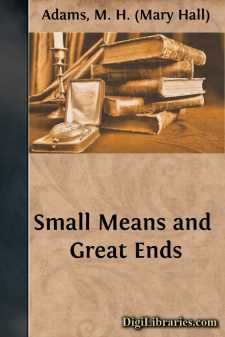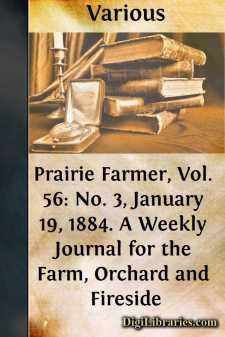Categories
- Antiques & Collectibles 13
- Architecture 36
- Art 48
- Bibles 22
- Biography & Autobiography 813
- Body, Mind & Spirit 142
- Business & Economics 28
- Children's Books 13
- Children's Fiction 10
- Computers 4
- Cooking 94
- Crafts & Hobbies 4
- Drama 346
- Education 46
- Family & Relationships 57
- Fiction 11828
- Games 19
- Gardening 17
- Health & Fitness 34
- History 1377
- House & Home 1
- Humor 147
- Juvenile Fiction 1873
- Juvenile Nonfiction 202
- Language Arts & Disciplines 88
- Law 16
- Literary Collections 686
- Literary Criticism 179
- Mathematics 13
- Medical 41
- Music 40
- Nature 179
- Non-Classifiable 1768
- Performing Arts 7
- Periodicals 1453
- Philosophy 64
- Photography 2
- Poetry 896
- Political Science 203
- Psychology 42
- Reference 154
- Religion 513
- Science 126
- Self-Help 84
- Social Science 81
- Sports & Recreation 34
- Study Aids 3
- Technology & Engineering 59
- Transportation 23
- Travel 463
- True Crime 29
Sort by:
SMALL MEANS AND GREAT ENDS; OR, THE WIDOW'S POT OF OIL. BY JULIA A. FLETCHER. "Oh! how I do wish I was rich!" said Eliza Melvyn, dropping her work in her lap, and looking up discontentedly to her mother; "why should not I be rich as well as Clara Payson? There she passes in her father's carriage, with her fine clothes, and haughty ways; while I sit here—sew—sewing—all day...
more...
THE PRESENT CONDITION OF ORGANIC NATURE. When it was my duty to consider what subject I would select for the six lectures [*To Working Men, at the Museum of Practical Geology, 1863.] which I shall now have the pleasure of delivering to you, it occurred to me that I could not do better than endeavour to put before you in a true light, or in what I might perhaps with more modesty call, that which I...
more...
A CHANGE OF TREATMENT "Yes, I've sailed under some 'cute skippers in my time," said the night-watchman; "them that go down in big ships see the wonders o' the deep, you know," he added with a sudden chuckle, "but the one I'm going to tell you about ought never to have been trusted out without 'is ma. A good many o' my skippers had fads, but this one was...
more...
by:
Grace Greenwood
CHAPTER I. Sketch of the Princess Charlotte—Her Love for her Mother—Anecdotes—HerHappy Girlhood—Her Marriage with Prince Leopold—Her Beautiful Life atClaremont—Baron Stockmar, the Coburg Mentor—Death of the PrincessCharlotte. It seems to me that the life of Queen Victoria cannot well be told without a prefacing sketch of her cousin, the Princess Charlotte, who, had she lived, would have...
more...
by:
P. Van Breda
THE AUTHOR TO THE READER. In offering my readers my reminiscences of the late War, I feel that it is necessary to ask their indulgence and to plead extenuating circumstances for many obvious shortcomings. It should be pointed out that the preparation of this work was attended with many difficulties and disabilities, of which the following were only a few:— (1) This is my first attempt at writing a...
more...
by:
Various
Editor Prairie Farmer—I write you in regard to the corn question. I would like to know if angle-worms damage corn. Eight years ago I came to the conclusion that I could raise double the number of bushels of corn that I was then raising. I then commenced experimenting on a small scale. I succeeded very well for the first three or four years. I got so that I could raise over ninety bushels per acre. In...
more...
by:
Warren Olney
Very interesting descriptions of the great battles of the late war, written by prominent generals, have been lately published and widely read. It seems to me, however, that it is time for the private soldier to be heard from. Of course, his field of vision is much more limited than that of his general. On the other hand, it is of vital importance to the latter to gloss over his mistakes, and draw...
more...
by:
Anonymous
HE Indians were formerly lords of the soil we now occupy, and obtained a subsistence principally by hunting and fishing. They generally lived in villages, containing from fifty to five hundred families. Their houses, called wigwams, were usually constructed of poles, one end being driven into the ground, and the other bent over so as to meet another fastened in like manner; both being joined together...
more...
by:
Charles Greville
June 29th, 1833 I am going, if not too lazy, to note down the everyday nothings of my life, and see what it looks like. We dined yesterday at Greenwich, the dinner given by Sefton, who took the whole party in his omnibus, and his great open carriage; Talleyrand, Madame de Dino, Standish, Neumann, and the Molyneux family; dined in a room called ‘the Apollo’ at the Crown and Sceptre. I thought we...
more...
LECTURE I. THE NEED OF UNDERSTANDING THE FALSE RELIGIONS It is said that the very latest among the sciences is the Science of Religion. Without pausing to inquire how far it admits of scientific treatment, certain reasons which may be urged for the study of the existing religions of the world will be considered in this lecture. It must be admitted in the outset that those who have been the pioneers in...
more...











